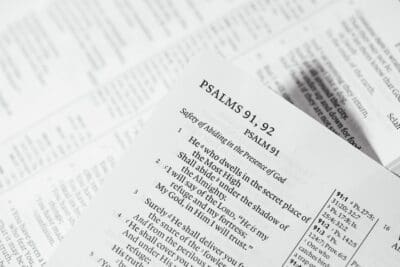Question from a Twitter follower:
“What does it mean ‘do not worry’ and how to do that in spite of the reality?”
Answer:
You are referring to Philippians 4:6…
The Lord is at hand; do not be anxious about anything, but in everything by prayer and supplication with thanksgiving let your requests be made known to God. And the peace of God, which surpasses all understanding, will guard your hearts and your minds in Christ Jesus. (Phil. 4:5-7)
While it is true that the apostle Paul is telling the church at Philippi not to be anxious, it is important to catch the tone of what he is saying, “The Lord is near, so don’t worry about anything. His peace is beyond understanding and this peace is able to guard your feelings and thoughts.” Paul is trying to comfort them, like in Isaiah 40, where God says, “Comfort, comfort my people…”
Paul had visited Philippi and led a number of influential people to faith in Christ, including Lydia and the Philippian jailer (see Acts 16). He had established a church there, but now Paul was in prison, “my imprisonment is for Christ” (Phil. 1:13). There were real reasons for anxiety. What would happen to their leader? What would happen to their church? What would happen to their faith? Would they be overwhelmed or would they be able to persevere? Paul says, “I am sure of this, that he who began a good work in you will bring it to completion at the day of Jesus Christ” (Phil 1:6).
Back to Philippians 4. How does Paul instruct them to battle against anxiety? First, Paul knows that they are anxious. Anxiety is a natural human reaction to trouble and turmoil. Paul knows that the circumstances have caused anxiety in the people of God, and he says, “Don’t worry, the Lord is near.” He reminds them that just because the circumstances are challenging, that does not mean God is far away. God is near to his people, and you are his people. Your circumstances are not the governing reality, God’s nearness is.
Then he tells them what to do about the anxiety, and he mentions 3 things: Prayer, supplication, and thanksgiving.
-
Don’t worry, remember who the Lord is, remember who you are praying to.
When things get tough prayer can quickly become nothing more than worry on my knees. Paul is instructing us to remind ourselves who we are talking to, “Lord, you are the Sustainer of all things. You sustain the galaxies, every star in the sky, and every molecule in every living thing on earth. Nothing is too difficult for you. Thank you that in Christ you come near to me, and you care for me. I’m not alone in this. I feel powerless right now, but you’re not powerless. And if with your love you come near to me, what could you accomplish in this situation?” Prayer begins with rehearsing who God is, and our relationship with him because of Jesus Christ. Like a good marinade, we need to soak our hearts and minds in who God is for us in Christ.
-
Don’t worry, bring your fears out into the open.
Hidden fears grow more powerful over time and they gain strength, escalating fear and anxiety. Supplication involves taking our worst fears out of the bag one-by-one, naming them, and setting them before the eyes of the Lord. “Lord, I’m afraid that this situation is going to blow up. I’m afraid so-and-so is going to confront me, and I don’t know what to say. I’m afraid I won’t have the courage to confront him or her. I’m not sure I can do this.” Fears that remain hidden grow over time. Bringing them out in the open, allows us to see them in a new light, in the light of God’s grace and love for us.
-
Don’t worry, give thanks.
Giving thanks reminds us of God’s faithfulness in the past. “Lord, thank you for the way you intervened in my son’s life, by bringing a Christian friend into his life. Lord, thank you for the way you provided for us, and for the very particular way you showed that you care about my needs. Lord, thank you for that message when I was discouraged about my family. Thank you for the way you used my trouble and your comfort in my life to minister to that person.” When I give thanks, I’m rehearsing the many times and ways that God has answered my prayers and shown his faithfulness to me.
Finally, Paul is telling us that the peace that God gives to us will guard our hearts and minds. God has peace, and he is able (and willing) to give it to us, even in the middle of difficult and unchanging circumstances. When trouble comes, our hearts are under attack by fears within and trouble from the outside, but God’s peace will protect our minds from anxious thoughts, and our hearts from feelings of despair. This is a great example of what Paul means when he says, “We walk by faith, not by sight” (2 Cor. 5:7). Yes, we experience the same circumstances and difficulties in life that other people do (illness, conflict, and loss) but by faith we also see that God is near to us and he is faithful to us.
Warmly in Christ,
Pastor Tim







